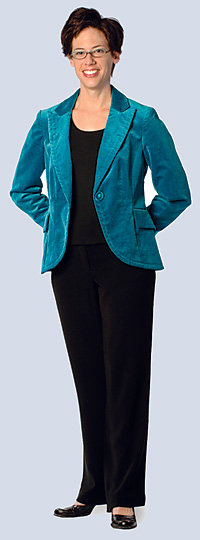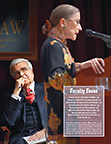Introducing Margaret Satterthwaite
Assistant Professor of Clinical Law
Printer Friendly Version To watch Margaret Satterthwaite field emails in her office, dressed conservatively in a crisp white button-down shirt and navy pantsuit—funky blue/brown plastic glasses not withstanding—one would never suspect that she once was a rebellious teen punker. Then again, nothing about this assistant professor of clinical law, who also holds a master’s degree in literature and once combed the streets of Haiti investigating human rights abuses, is predictable.
To watch Margaret Satterthwaite field emails in her office, dressed conservatively in a crisp white button-down shirt and navy pantsuit—funky blue/brown plastic glasses not withstanding—one would never suspect that she once was a rebellious teen punker. Then again, nothing about this assistant professor of clinical law, who also holds a master’s degree in literature and once combed the streets of Haiti investigating human rights abuses, is predictable.
“An unconventional career path? Is it?” Satterthwaite ’99 asks about herself. “I certainly didn’t want to be a lawyer initially,” she concedes. “I wanted to be an activist.”
These days, as a faculty director of the Center for Human Rights and Global Justice (CHRGJ), Satterthwaite, 37, is a little bit of both. “She is among a handful of scholars in the United States who have managed to combine very thorough and nuanced scholarship with timely and pathbreaking analyses of the most pressing issues confronting practitioners in this area,” says Professor Philip Alston, who heads up the CHRGJ.
In the three years since returning to her alma mater to teach, she has generated several important human rights reports and articles. In 2004, Satterthwaite and CHRGJ researchers, in conjunction with a committee of the Association of the Bar of the City of New York, released a hefty legal report called “Torture by Proxy: International and Domestic Law Applicable to ‘Extraordinary Renditions.’” The report concluded that “extraordinary rendition”—sending suspected terrorists to countries where they risk being tortured under interrogation—is not authorized by any publicly available statute, regulation or executive finding and violates international law binding on the U.S. Satterthwaite is expanding that research into a scholarly piece, “Extraordinary Rendition: Testing the Limits of Human Rights Law,” which is expected to be published this winter in the George Washington University Law Review. In “Fate and Whereabouts Unknown: Detainees in the ‘War on Terror’” (CHRGJ Dec. 2005), Satterthwaite looked at a related issue: the enforced disappearances of terrorist suspects—detainees who are held in secret locations by the U.S.—many of whom were allegedly involved in the 9/11 attacks.
Satterthwaite was raised in Maryland and Virginia by her divorced mom, Sara, 63, who worked in a series of “pink-collar jobs,” such as dental hygienist. As a teenager, she says, “I was politically aware and felt like high school was this world of trying to look good and going to proms.” She fell into a group of activists and jumped at the opportunity to enter the New School’s Eugene Lang College a year early. She took to New York City, and soon became involved in Amnesty International (AI).
Satterthwaite earned her B.A. in 1990, majoring in literature and gender studies, then headed to California, where she worked as an editorial assistant in a publishing company before entering a Ph.D. program in literature at the University of California at Santa Cruz. Her intention was to become a college professor, but she left after earning her M.A. to follow her activist passion: “I realized that the thing that really excited me was human rights work.” Moving to Washington, D.C., in 1994, she directed AI’s campaign on gay and lesbian rights before joining a human rights organization called Street Law. She also had the opportunity to travel to Haiti, where she was an investigator for the Haitian National Truth and Justice Commission; she learned Kreyol and investigated the human rights abuses that occurred during president Jean-Bertrand Aristide’s exile from 1991 to 1994. The work she did in Haiti, with a team led by an impressive, Haitian lawyer, made her realize the importance of a law degree.
She was accepted into NYU on a Root-Tilden-Kern scholarship, and did two summer internships—one representing Haitian asylum-seekers and the other working for a human rights organization in Port-au-Prince. After law school, Satterthwaite completed two clerkships—one with Judge Betty B. Fletcher of the Ninth Circuit, and a second at the International Court of Justice in The Hague. Between clerkships she was a Furman Fellow at Human Rights First. In 2002, she worked for the U.N. Development Fund for Women, becoming interested in the plight of women migrant workers—a focus that has been the subject of her current and previous scholarship, including “Crossing Borders, Claiming Rights: Using Human Rights Law to Empower Women Migrant Workers” (Yale Human Rights and Development Law Journal 2005).
She returned to teach at the Law School in the fall of 2003, and in January 2006 became a faculty director at the CHRGJ and an assistant professor of clinical law. She also settled down, marrying her partner, Alison Nathan, a visiting assistant professor at Fordham Law School, last spring. “I thought I’d have a couple more years working in human rights,” she says of the latest turn in her career path, “but this was my dream job. It allows me to combine advocacy with scholarship and teaching.”
—
